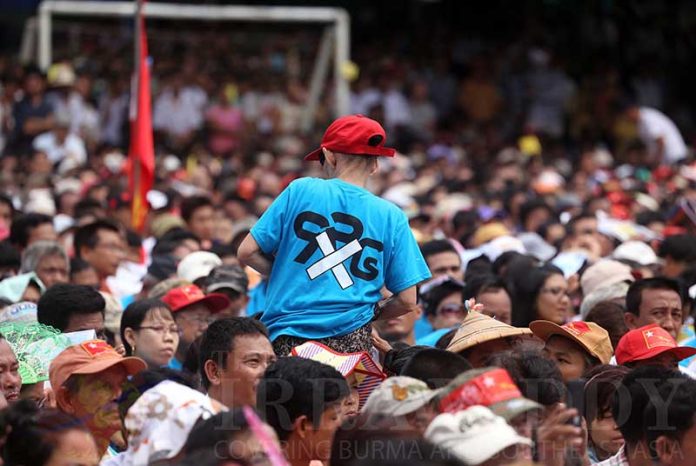The National League for Democracy (NLD) and its leader Daw Aung San Suu Kyi, have faced intimidation from Burma’s electoral commission in recent weeks as the campaign to amend Burma’s 2008 Constitution continues to draw strong support throughout the country.
The National League for Democracy (NLD) and its leader Daw Aung San Suu Kyi, have faced intimidation from Burma’s electoral commission in recent weeks as the campaign to amend Burma’s 2008 Constitution continues to draw strong support throughout the country. As the public rallies behind the campaign, Burma’s ruling Union Solidarity and Development Party (USDP) have accused the campaign leaders of sowing public unrest and disorder.
Last month, Daw Aung San Suu Kyi spoke to a crowd of over 20,000 supporters in Mandalay, calling on the military to forgo their fear of constitutional amendment in support of democratic reform. According to a recent statement from Human Rights Watch, the Union Electoral Commission (UEC) subsequently warned the NLD leader that such comments are illegal and unconstitutional, and could jeopardize her party’s re-registration ahead of by-elections in 2014. The NLD has responded to the UEC’s warning as inappropriate, owing to the fact that political parties are allowed to stage rallies so long as they are in accordance with the law.
There have been many attempts in the past to clamp down on the NLD’s right to freedom of speech and movement. In April, the UEC announced a proposal that tried to restrict political party leaders from canvassing outside their district in a clear attempt to bar the NLD leader from conducting a nationwide campaign.
Daw Aung San Suu Kyi began discussions with the ruling USDP regarding constitutional reform in 2013. She became increasingly vocal in November as the timeframe for submission to the parliamentary Joint Committee for Reviewing the Constitution entered its final months. While public concern was initially focused on Article 59(f) of the constitution, which effectively bars Daw Aung San Suuu Kyi from running as president, the recent campaign joined by the 88 Generation Peace and Open Society in 2014 has strategically focused on Article 436. Article 436 requires the approval of at least 75% of the members of both houses of Parliament to amend the constitution. In addition, Article 109(b) stipulates 25% military allocation in Parliament, giving the military an effective veto over changes.
Gaining momentum in May, the campaign has drawn a crowd by tens of thousands nationwide, who have joined together to advocate for changes to the current constitution. On 27 May 2014, the joint group began gathering signatures in support of amending Article 436. The campaign will collect the signatures through July 19 and will submit these to the Parliament’s Constitution Review Committee.
Constitutional revision is also fundamental to resolving the ethnic armed struggles. The NLD and 88 Generation Peace and Open Society have sought support from United Nationalities Alliance, a coalition of 12 ethnic political parties, to hold rallies calling for constitutional reform, stressing the importance of ethnic equality to be guaranteed in a genuine federal union. As ceasefire negotiations move forward, the ethnic groups have sought greater autonomy for their people. In order to resolve issues surrounding equality, self-determination, security, and natural resources among other pressing issues, constitutional reform must ensure full political representation of Burma’s diverse ethnic groups. Without amendments, the military will retain a tight grip on the power to veto any future constitutional amendments.
In addition, the 2008 Constitution – drafted by the military – gives the security forces immunity from crimes committed during junta’s rule, allowing those in power to stay above the law and continue to perpetrate heinous crimes with impunity. This undemocratic constitution must be changed to reflect the collective aspiration of the people of Burma and to embrace the fundamental principles of human rights.
Despite the series of reforms welcomed by the international community, Burma’s constitution still falls short of meeting fair and fundamental democratic principles and international human rights standards. A change in the constitution will open the door to a transition that will lead the way to a more democratic nation. The international community must not judge the reforms at face value, but dig below the surface in support of fundamental changes in Burma’s constitution that respects the human rights of all people of Burma.
In addition, anti-democratic stipulations position opposition parties at a disadvantage, and this will not set a good precedent for free and fair elections in 2015. The UEC must not curtail the right of the NLD and its leaders or any other opposition parties to exercise freedom of speech and expression by threatening or intimidating them. If Burma’s nominally civilian government is serious about democratization, it must support the calls for constitutional amendment and speed up the process of constitutional change well ahead of the 2015 elections.
Source: www.burmapartnerhsip.org


